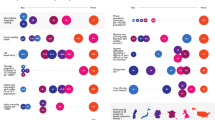
Overview
- Provides a political account of South Korea's democratisation process
- Reflects on the return of class as a key concept to understanding contemporary Korean society
- Assesses South Korea’s stance in regional and global politics
- Includes supplementary material: sn.pub/extras
Access this book
Tax calculation will be finalised at checkout
Other ways to access
About this book
This book studies the sources of inequality in contemporary South Korea and the social and political contention this engenders. Korean society is becoming more polarized. Demands for ‘economic democratization’ and a fairer redistribution of wealth occupy centre-stage of political campaigns, debates and discourse. The contributions offer perspectives on this wide-ranging socio-political change by examining the transformation of organized labour, civil society, the emergence of new cleavages in society, and the growing ethnic diversity of Korea’s population. Bringing together a team of scholars on Korea’s transition and democratization, the story the books tells is one of a society acutely divided by the neo-liberal policies that accompanied and followed the Asian financial crisis. Taken together, the contributions argue that tackling inequalities are challenges that Korean policy-makers can no longer postpone. The solution, however, cannot be imposed, once again, from the top down, but needs to arise from a broader conversation including all segments of Korean society. The book is intended for a readership interested in South Korean politics specifically, and global experiences in transition more generally.
Similar content being viewed by others
Keywords
- neo-liberalism
- democracy in South Korea
- democratic legitimacy in South Korea
- public discontent in South Korea
- economic reforms in South Korea
- political cleavages in South Korea
- class divides in South Korea
- economic divides in South Korea
- generational divides in South Korea
- Asian advanced industrial societies
- power and influence of South Korea
- Post-Development Korea
- distribution of wealth in South Korea
- civil society in South Korea
- ethnic diversity in South Korea
- inequality in South Korea
- democracy
Table of contents (12 chapters)
-
Front Matter
-
Back Matter
Editors and Affiliations
About the editor
Youngmi Kim is Senior Lecturer in the Department of Asian Studies at the University of Edinburgh (UK). She previously worked at Central European University and University College Dublin. Recent publications include articles in Electoral Studies and the monograph The Politics of Coalition in South Korea: Between Institutions and Culture (2011).
Bibliographic Information
Book Title: Korea’s Quest for Economic Democratization
Book Subtitle: Globalization, Polarization and Contention
Editors: Youngmi Kim
DOI: https://doi.org/10.1007/978-3-319-57066-2
Publisher: Palgrave Macmillan Cham
eBook Packages: Political Science and International Studies, Political Science and International Studies (R0)
Copyright Information: The Editor(s) (if applicable) and The Author(s) 2018
Hardcover ISBN: 978-3-319-57065-5Published: 20 September 2017
Softcover ISBN: 978-3-319-86069-5Published: 14 August 2018
eBook ISBN: 978-3-319-57066-2Published: 06 September 2017
Edition Number: 1
Number of Pages: XVII, 303
Number of Illustrations: 6 b/w illustrations
Topics: Asian Politics, Democracy, International Political Economy, Globalization



